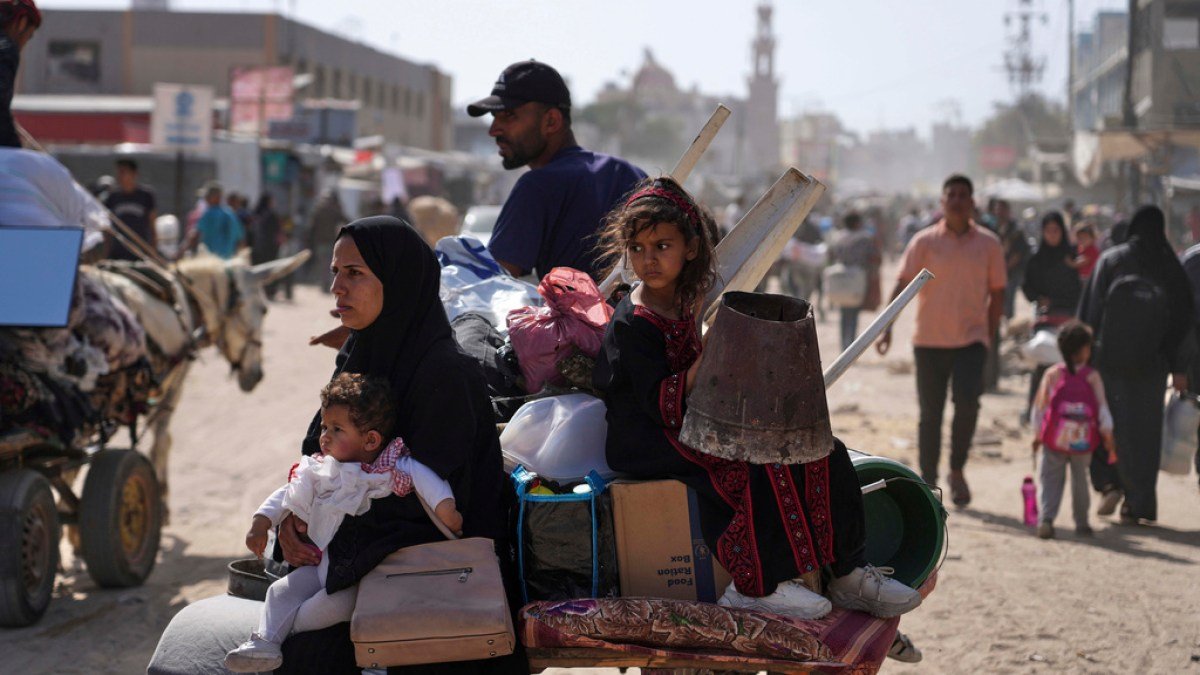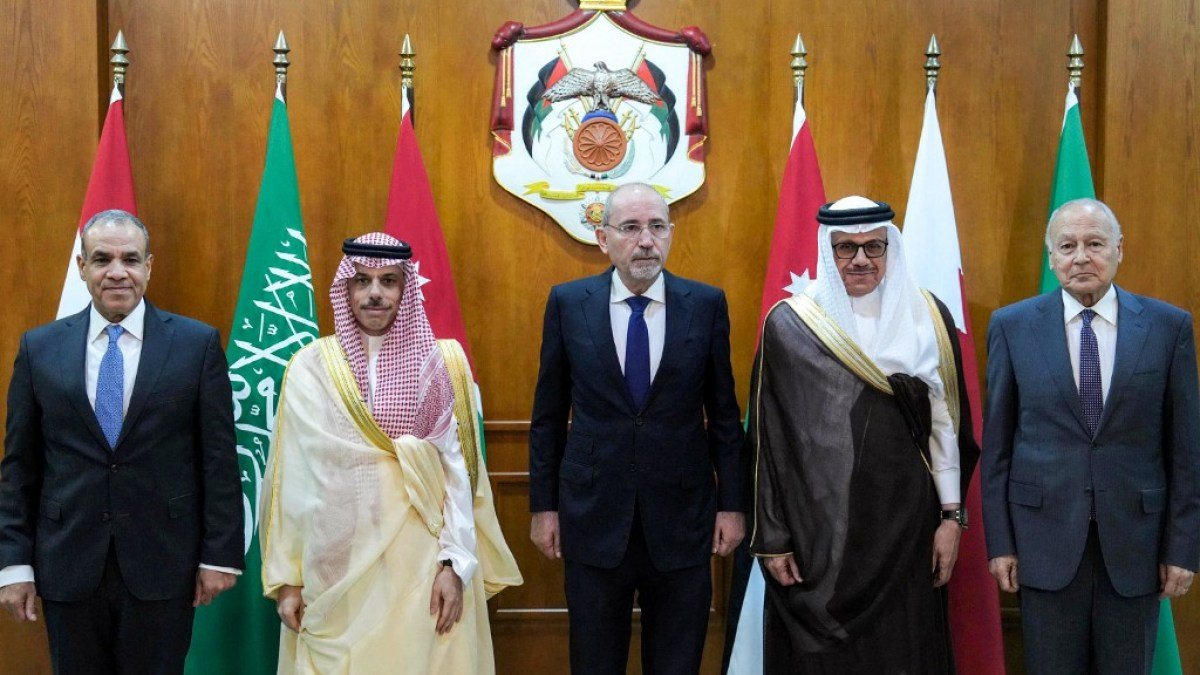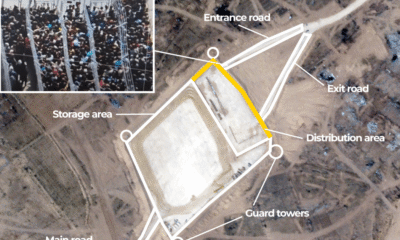Middle East
What is the Gaza Humanitarian Foundation, and why has it been criticised? | Gaza News

The United States says a new Israeli-approved organisation – the Gaza Humanitarian Foundation (GHF) – is the key to resolving the humanitarian crisis in the Gaza Strip, but it already is receiving its fair share of criticism.
The GHF says it is going to start operations before the end of May. United Nations officials and humanitarian groups say it will not have the ability to deal with the humanitarian catastrophe unfolding in Gaza as a result of Israel’s two-month-long blockade.
Instead, the aid groups that have been working in Gaza point out that they have the capacity to bring in food and other humanitarian supplies – if only Israel would let them.
So what is the GHF, and why is the situation in Gaza so desperate? Here’s everything you need to know:
What is the Gaza Humanitarian Foundation?
Officially independent, the GHF is an Israeli- and US-backed body that plans to distribute aid in the Gaza Strip.
One in five people in Gaza currently face starvation due to the Israeli blockade of food and aid while 93 percent are experiencing acute food shortages, according to a UN-backed assessment released last week.
Under increasing international pressure to allow in aid, Israel has sought to find a solution that it says prevents aid from falling into the hands of the Palestinian group Hamas. Humanitarian organisations say the vast majority of food and other supplies reaches Gaza’s civilian population and is not diverted to fighters.
The GHF will be overseen by Jake Wood, a US military veteran who ran Team Rubicon, an organisation that distributed humanitarian aid during natural disasters.

What’s the plan for delivering the aid?
Through the GHF, Palestinians in Gaza would receive a “basic amount of food”.
The initial plan was announced last Wednesday with a timeline of about two weeks before it was up and running.
It’s still unclear how the GHF will be funded, but the foundation says it will set up “secure distribution sites” to feed 1.2 million people in Gaza before expanding to feed every Palestinian in the territory.
It says it will coordinate with the Israeli military while security would be provided by private military contractors.
Why is the GHF being criticised?
The GHF initiative has been widely panned by aid groups and the UN.
The UN and humanitarian aid agencies say they already have the means to distribute desperately needed aid and alleviate the suffering of Palestinians in Gaza. The GHF, on the other hand, is seen by critics as a way of politicising aid and not having the experience or capacity to bring aid to more than two million people.
The GHF “restricts aid to only one part of Gaza while leaving other dire needs unmet”, UN humanitarian chief Tom Fletcher said at the Security Council last week. “It makes aid conditional on political and military aims. It makes starvation a bargaining chip. It is cynical sideshow. A deliberate distraction. A fig leaf for further violence and displacement.”
The UN and aid groups say the GHF plan violates basic humanitarian principles.
“We are concerned by the proposed aid mechanism for Gaza and are deeply worried that it will not allow for humanitarian aid to be distributed in a manner consistent with core humanitarian principles of impartiality, humanity, and independence,” a statement from the International Committee of the Red Cross (ICRC) said. “The ICRC cannot work under any mechanism that doesn’t allow us to uphold the principles and our modalities of work.”
Eleven humanitarian and human rights organisations signed a statement in which they “unequivocally reject the establishment” of the GHF, calling it:
“A project led by politically connected Western security and military figures, coordinated in tandem with the Israeli government, and launched while the people of Gaza remain under total siege. It lacks any Palestinian involvement in its design or implementation.”
That lack of Palestinian involvement, coupled with Israel’s approval for the project and the planned presence of the Israeli military “on the perimeter” of the distribution sites, according to US Ambassador to Israel Mike Huckabee, raises Palestinian suspicions that the establishment of the GHF will give even more power to Israel over aid distribution in Gaza.
Why is aid not reaching Gaza?
Israel is blocking it.
Israel began preventing the entry of all food and other humanitarian supplies into Gaza on March 2 during a ceasefire, which it unilaterally broke on March 18.
Even before the blockade, Israel restricted the amount of aid that could come in, and some Israeli protesters also blocked and destroyed aid.
The situation has reached dire levels with the World Food Programme saying 70,000 children need urgent treatment for “acute malnutrition”.
How would the GHF displace Palestinians?
The UN said the GHF would weaponise aid by threatening the mass displacement of Palestinians.
Initial aid distribution sites would operate only out of southern and central Gaza, which the UN warned could lead to the displacement of Palestinians in northern Gaza as they are forced to move south for food and other aid.
“Humanitarian aid should not be politicized nor militarized,” the ICRC statement said. “This erodes the neutrality required to ensure assistance is delivered based solely on need, not political or military agendas.”
The initiative has also been labelled by many in the humanitarian sector as insufficient.
“Even if implemented, the plan’s proposed aid volumes fall short of the immense scale of needs in Gaza,” according to the ICRC. “The level of need right now is overwhelming, and aid needs to be allowed to enter immediately and without impediment.”
Gaza currently has 400 distribution points, and the ability and know-how to distribute aid effectively exists. With only a few distribution points under the GHF, people may be forced to walk long distances and carry heavy rations.
“The Problem is Not Logistics,” the statement from the 11 humanitarian groups read. “It Is Intentional Starvation.”
Enough. We demand rapid, safe, and unimpeded access to starving civilians in Gaza.
We have a plan. We have thousands of trucks of food at the border. Let us in. Let us work.https://t.co/J55f8shIEU pic.twitter.com/bTmcAMbG0e
— Tom Fletcher (@UNReliefChief) May 16, 2025
People with disabilities or who are injured would struggle to navigate the terrain and reach distribution points. The roads in Gaza have been badly damaged over the past 19 months of war, and the intensity of Israel’s latest military operation in Gaza is only making things more difficult for Palestinians there.
Furthermore, the GHF’s assertions that it is independent and transparent have been criticised by aid groups.
“Despite branding itself as ‘independent’ and ‘transparent,’ the Gaza Humanitarian Foundation would be wholly dependent on Israeli coordination and operates via Israeli-controlled entry points, primarily the Port of Ashdod and the Kerem Shalom/Karem Abu Salem crossing,” the statement by the 11 aid groups read.
While Hanan Salah, Human Rights Watch’s associate director for the Middle East and North Africa, didn’t comment specifically on the GHF, she said allowing “a basic amount of food” into the Gaza Strip was “complicity in using starvation as a method of warfare”.
Middle East
Aid ship aiming to break Israel’s siege of Gaza sets sail from Italy | Israel-Palestine conflict News

The 12-person crew, which includes climate activist Greta Thunberg, expects to take seven days to reach Gaza.
International nonprofit organisation Freedom Flotilla Coalition (FFC) says one of its vessels has left Sicily to deliver humanitarian aid to Gaza, after a previous attempt failed due to a drone attack on a different ship in the Mediterranean.
The 12-person crew, which includes Swedish climate activist Greta Thunberg, Irish actor Liam Cunningham and Franco-Palestinian MEP Rima Hassan, set sail on the Madleen from the port of Catania on Sunday, carrying barrels of relief supplies that the group called “limited amounts, though symbolic”.
The voyage comes after another vessel operated by the group, the Conscience, was hit by two drones just outside Maltese territorial waters in early May. While FFC said Israel was to blame for the incident, it has not responded to requests for comment.
“We are doing this because no matter what odds we are against, we have to keep trying, because the moment we stop trying is when we lose our humanity,” Thunberg told reporters at a news conference before the departure. The Swedish climate activist had been due to board the Conscience.
She added that “no matter how dangerous this mission is, it is nowhere near as dangerous as the silence of the entire world in the face of the lives being genocised”.
🇵🇸 ⛵️ Avec @GretaThunberg nous appelons à la mobilisation citoyenne pour soutenir massivement le navire humanitaire de @GazaFFlotilla ! C’est le seul moyen de garantir notre sécurité. 🙏 pic.twitter.com/5DUJbkRdPZ
— Rima Hassan (@RimaHas) June 1, 2025
The activists expect to take seven days to reach their destination, if they are not stopped.
The FCC, launched in 2010, is a non-violent international movement supporting Palestinians, combining humanitarian aid with political protest against the blockade on Gaza.
It said the trip “is not charity. This is a non-violent, direct action to challenge Israel’s illegal siege and escalating war crimes”.
United Nations agencies and major aid groups say Israeli restrictions, the breakdown of law and order, and widespread looting make it extremely difficult to deliver aid to Gaza’s roughly two million inhabitants.
The situation in Gaza is at its worst since the war between Israel and Hamas began 19 months ago, the UN said on Friday, despite a resumption of limited aid deliveries in the Palestinian enclave.
Under growing global pressure, Israel ended an 11-week blockade on Gaza on May 19, allowing extremely limited UN-led operations to resume.
On Monday, a new avenue for aid distribution was also launched: the Gaza Humanitarian Foundation, backed by the United States and Israel, but with the UN and international aid groups refusing to work with it, saying it is not neutral and has a distribution model that forces the displacement of Palestinians.
The FCC is the latest among a growing number of critics to accuse Israel of genocidal acts in its war in Gaza, allegations Israel vehemently denies.
“We are breaking the siege of Gaza by sea, but that’s part of a broader strategy of mobilisations that will also attempt to break the siege by land,” said activist Thiago Avila.
Avila also mentioned the upcoming Global March to Gaza – an international initiative also open to doctors, lawyers and members of the media – which is set to leave Egypt and reach the Rafah crossing in mid-June to stage a protest there, calling on Israel to stop the Gaza offensive and reopen the border.
Middle East
Does damning IAEA report mark end of an Iran nuclear deal? | Nuclear Weapons

Tehran denounces enriched uranium accusations as US urges Iran to accept proposed agreement.
The United Nations nuclear watchdog has delivered its most damning allegations against Iran in nearly two decades.
It comes as the United States proposes a nuclear deal that it says is in Tehran’s best interests to accept.
But Tehran is accusing the West of political pressure and warns it will take “appropriate countermeasures” if European powers reimpose sanctions.
So is there still room for a deal?
Or will the US, United Kingdom, France and Germany declare Iran in violation of its nonproliferation obligations?
Presenter: James Bays
Guests:
Hassan Ahmadian – assistant professor at the University of Tehran
Ali Vaez – Iran project director at the International Crisis Group
Sahil Shah – independent security analyst specialising in nuclear disarmament and nonproliferation policy
Middle East
Saudi Arabia calls Israel barring Arab ministers West Bank trip ‘extremism’ | Israel-Palestine conflict News

Foreign ministers from Egypt, Jordan, Qatar, Saudi Arabia, and the UAE had planned the visit to discuss Palestinian statehood and end to war on Gaza.
Saudi Arabia has accused Israel of “extremism and rejection of peace” after it blocked a planned visit by Arab foreign ministers to the occupied West Bank.
Saudi Foreign Minister Prince Faisal bin Farhan Al Saud made the remarks during a joint news conference in Jordan’s capital, Amman, on Sunday with his counterparts from Jordan, Egypt, and Bahrain.
“Israel’s refusal of the committee’s visit to the West Bank embodies and confirms its extremism and refusal of any serious attempts for [a] peaceful pathway … It strengthens our will to double our diplomatic efforts within the international community to face this arrogance,” Prince Faisal said.
His comments followed Israel’s decision to block the Arab delegation from reaching Ramallah, where they were set to meet Palestinian President Mahmoud Abbas. The ministers from Egypt, Jordan, Qatar, Saudi Arabia, and the United Arab Emirates (UAE) had planned the visit as part of efforts to support Palestinian diplomacy amid Israel’s ongoing war on Gaza.
Israel controls the airspace and borders of the West Bank, and on Friday announced it would not grant permission for the visit.
“The Palestinian Authority – which to this day refuses to condemn the October 7 massacre – intended to host in Ramallah a provocative meeting of foreign ministers from Arab countries to discuss the promotion of the establishment of a Palestinian state,” an Israeli official had said, adding that Israel will “not cooperate” with the visit.
Prince Faisal’s trip to the West Bank would have marked the first such visit by a top Saudi official in recent memory.
Jordan’s Foreign Minister Ayman Safadi said blocking the trip was another example of how Israel was “killing any chance of a just and comprehensive” Arab-Israeli settlement.
An international conference, co-chaired by France and Saudi Arabia, is due to be held in New York from June 17 to 20 to discuss the issue of Palestinian statehood.
Egyptian Foreign Minister Badr Abdelatty said the conference would cover security arrangements after a ceasefire in Gaza and reconstruction plans to ensure Palestinians would remain on their land and foil any Israeli plans to evict them.
Israel has come under increasing pressure from the United Nations and European countries, which favour a two-state solution to the Israeli-Palestinian conflict, under which an independent Palestinian state would exist alongside Israel.
-

 Lifestyle5 days ago
Lifestyle5 days agoFaizan Zaki hopes to go from spelling bee runner-up to champ
-

 Lifestyle4 days ago
Lifestyle4 days agoChildren and careers: Talking to kids about what they want to be when they grow up
-

 Europe4 days ago
Europe4 days agoTop Kremlin aide says Trump ‘not sufficiently informed’ about Ukraine after US president lashes out at Putin
-

 Sports4 days ago
Sports4 days agoThe Knicks are bringing hope and title dreams back to New York after years in the doldrums
-

 Conflict Zones4 days ago
Conflict Zones4 days agoCambodia PM urges calm after border clash with Thailand leaves soldier dead | Border Disputes News
-

 Africa5 days ago
Africa5 days agoHaiti health officials meet to discuss shortage of HIV/AIDS medication
-

 Middle East4 days ago
Middle East4 days agoVisual guide to how the Gaza aid distribution turmoil unfolded | Israel-Palestine conflict News
-

 Asia4 days ago
Asia4 days agoAnalysis: China thought it had a truce with the US. Then Trump dropped two bombshells




